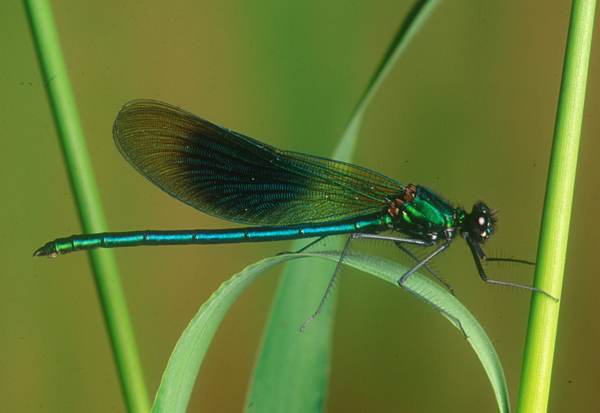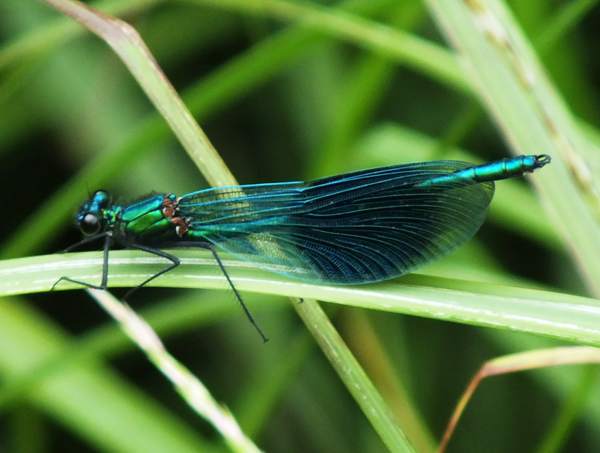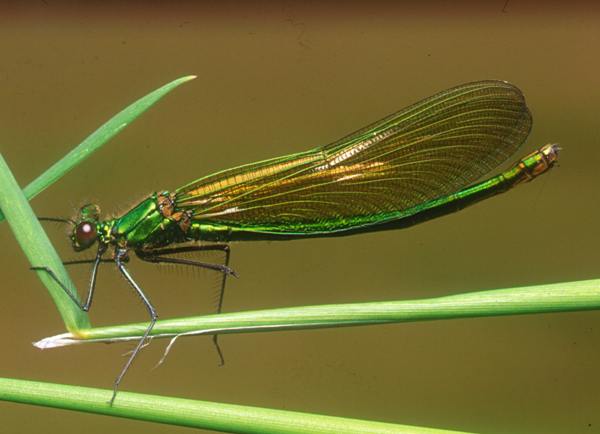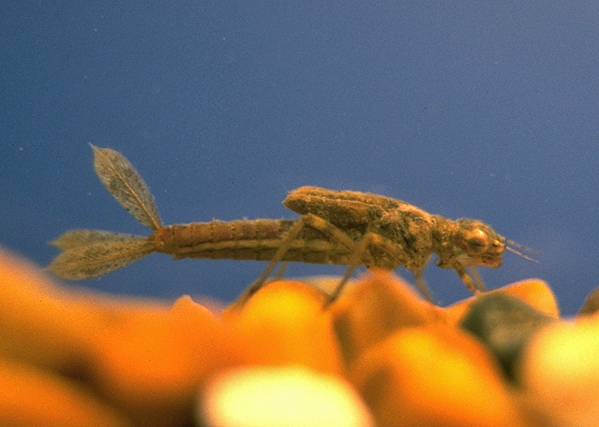Trees Birds Mammals Fish Amphibians Reptiles
Wild Algarve
Bookshop
Calopteryx splendens - Banded Demoiselle
Phylum: Arthropoda - Class: Insecta - Order: Odonata - Family: Calopterygidae

Above: Calopteryx splendens, Banded Demoiselle, male
The Banded Demoiselle is a river insect, and it breeds mainly in slow-flowing, muddy reaches of rivers and streams. Occasionally this large and lovely damselfly breeds in shallow silt-rich ponds; we have them in our garden pond along with Common Blue and Large Red damselflies and three dragonfly species.

In the summer sunshine there can be few more splendid sights than these delightful insects with their iridescent bodies and elegant wings. The female is similar to Calopteryx virgo, but the male has quite distinctive smoky wing patches.

Calopteryx splendens, Banded Demoiselle, female
Flyfishing tactics
In most fast-flowing rivers there is limited opportunity to use a damselnymph imitation, as the natural nymphs are slow moving creatures.

Places where a damsel nymph can be effective include the River Monnow, in Wales, and the River Boyne, in Ireland, Each of these great flyfishing rivers have many slow-flowing stretches where the water drifts along lazily between reed-fringed banks. In the reedy areas, where trapped silt builds up and is not swept away easily during spates, Calopteryx splendens, the Banded Demoiselle, lives in surprisingly large colonies.
To imitate these sizeable morsels, try a large green nymph (tied on a size 6 or 8 long-shank hook) drawn slowly along near the riverbed and as close as you can to the reeds. Trout get to eat many more of the immature nymphs than they ever do of the adult damselfliesm, and so an imitation of the winged adult is unnecessary
In southern Britain the Banded Demoiselle, also known as the Banded Agrion, is a very common damselfly, but it is found mainly in southern and central England, in Wales, and in southern and central Ireland. Further north it becomes increasingly scarce and localised.
There are about forty species of dragonflies and damselflies in the British Isles, although some are now quite rare and hardly ever seen.
Excited by rivers and streams? So are we, and we're pretty sure you would find the Winding River Mystery trilogy of action-packed thrillers gripping reading too. Dead Drift, Dead Cert, and Dead End are Pat O'Reilly's latest river-based novels, and now they are available in ebook format. Full details on our website here...
Buy each volume in ebook format for only £2.47 on Amazon... Paperbacks also available on Amazon at £6.95 each. All proceeds go towards keeping the First Nature website online.
Please Help Us: If you have found this information interesting and useful, please consider helping to keep First Nature online by making a small donation towards the web hosting and internet costs.
Any donations over and above the essential running costs will help support the conservation work of Plantlife, the Rivers Trust and charitable botanic gardens - as do author royalties and publisher proceeds from books by Pat and Sue.